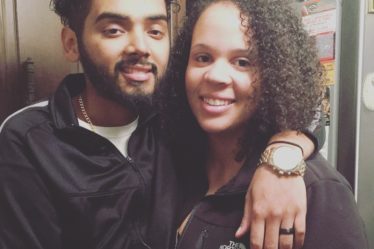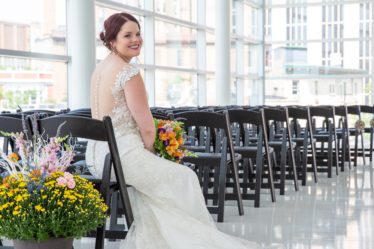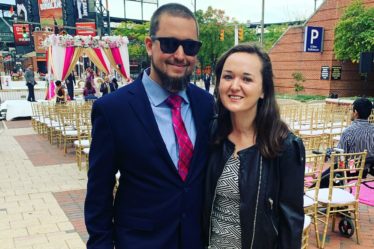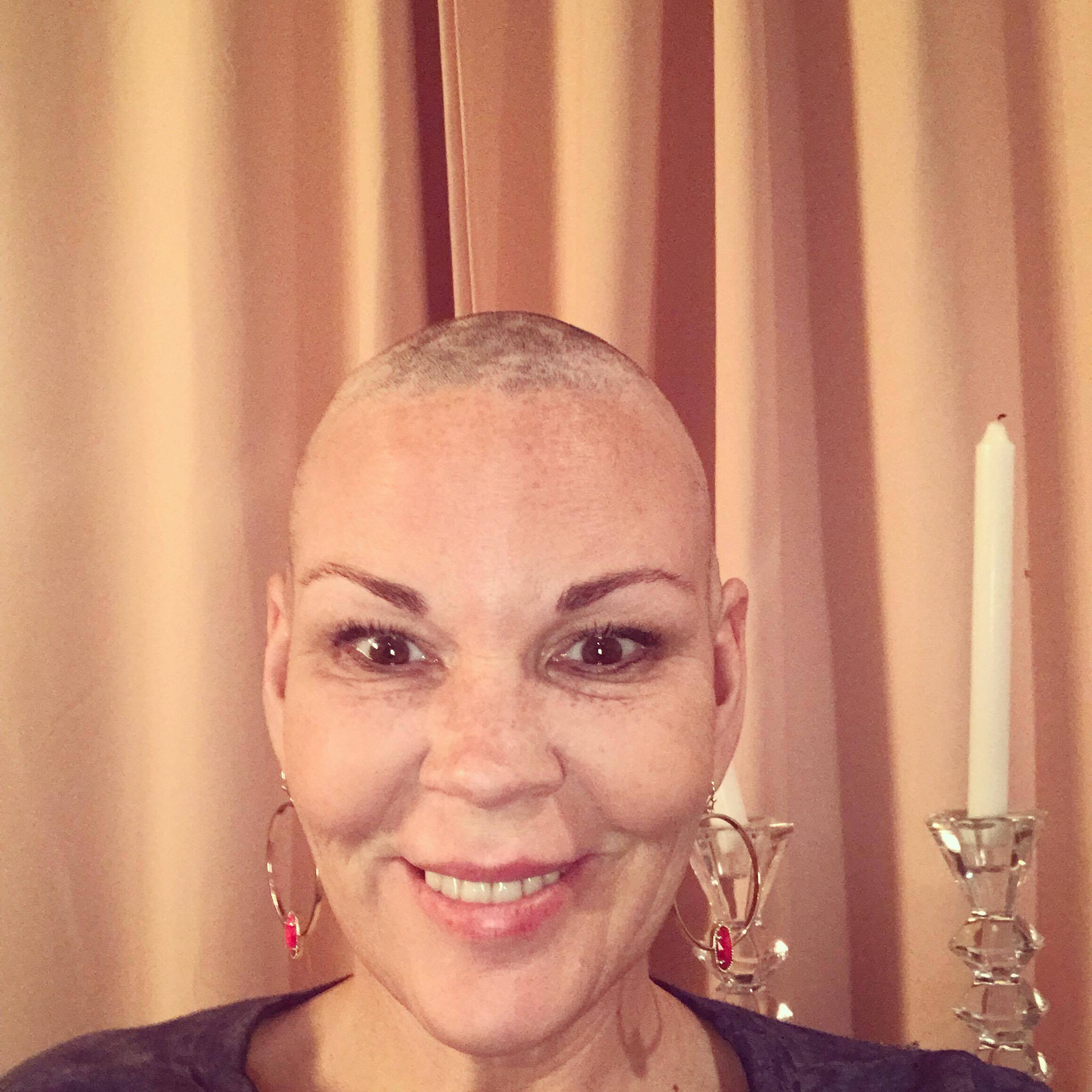
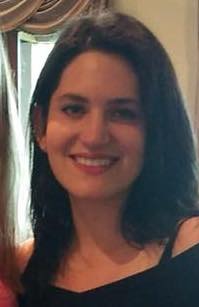

By Rachael Oats, Jenna Lindman
After posting my last blog about Vanessa, who battled cervical cancer in South Africa, I decided that I wanted to learn more about this cancer in the US. It wasn’t until a few weeks ago that I had spoken with anyone about cervical cancer, so I decided to start poking around the internet. I learned a few things, like how HPV is sometimes precursor for cervical cancer, and that women who smoke are twice as likely to be diagnosed versus women who don’t smoke. Also, over 13,000 women will be diagnosed with cervical cancer this year alone.
I went on the Teal Ladies Facebook page and found Rachael Oats of Dallas, Texas. Rachael is a 44-year-old, two-time cervical cancer fighter, who oddly doesn’t have cancer in her cervix but in the lymph nodes around the cervix and other places in her body. She was first diagnosed in March of 2018, beat it, and is now fighting a second bout. Rachael agreed to interview about her cancer journey. I was inspired her pragmatic outlook, despite the 20% five-year survival rate the doctor gave her. She still works as an Associate Executive Director for the National Athletic Trainers Association, she loves to travel, read, and take on any new adventures she can. Even more badass than that, she used to do roller derby. Rachael, thank you so much for having this phone interview with me and sharing your story.
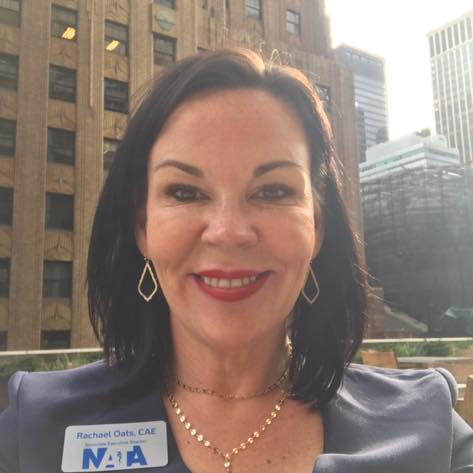
What are the characteristics of the cancer you had?
My case is very atypical. I never had an abnormal pap, and I went for annual exams like clockwork. I’ve never been diagnosed with HPV (95% of cervical cancer is caused by it; subsequent testing showed that I do have HPV). However, there was no cancer in, on, around my cervix; just in lymph nodes. It was only found because I thought I pulled a groin muscle doing yoga. I went to three physicians; all of whom said I was ok. I knew something wasn’t right so I went to a sports medicine physician, who I know through work. He ordered a pelvic MRI and made an appointment with an oncologist the next morning at 8am. It was a crazy 12 hours!!!
Are you currently in remission? If so for how long? If not, how long have you been battling?
No. I was NED in October but it came back when I went for 3-month follow up. Now it’s in my lymph nodes near my tummy and a new tumor is in my liver.
How did you tell the people in your life and how did they handle it?
To be honest, with the exception of my boss, I didn’t really tell many of my friends, in my head I thought this is something I’m gonna do, I’m gonna take short term leave, do seven weeks of treatment, and I’ll be back and everything will be fine. So, there’s really no need to bother anybody with it. So that’s kind of how I handled it the first time. And then when it came back I knew that the prognosis was pretty dire, so I told my staff at work, and I posted on Facebook and let my friends and sorority sisters and I let people know this time and I’m letting them be there for me and do things for me, whereas before I just kind of isolated myself and tried to get through it on my own. Which I did, but I guess you don’t realize you need people until they’re there for you. It’s been a lot easier this time having help and having people who will just come sit with me when I’m not feeling well and sending me cards and things like that. The association I work for has 50,000 members and since I’ve been there 20 years I know so many people. So, the love I’ve been receiving from around the country has just really done a lot for my attitude.
That’s wonderful, I’m glad you were able to share that with them.
Yeah, definitely. I think it was the right way to go
So you have been your own primary caregiver through all of this?
Yes
That’s amazing. So you’ve got two big roles there: battling this and caregiving for yourself. So really, that’s amazing.
I will say my former mother-in-law has been amazing. She was aware the first time and she has taken me to so many of my appointments and sat with me through chemo both times. She’s always been like a second mother to me even after the marriage didn’t work out. I am really fortunate to have her as well as my former father-in-law in my life because they really have been able to help and do a lot; but groceries for me when I’m not up for going to the store, fixing my toilet while I’m in the hospital, things like that.
When you were first diagnosed, you said you had surgery and chemo and radiation. What does the treatment plan actually look like and what were some of the side effects you experienced?
The chemo I had previously was Cisplatin and it is a light form of chemo which is basically a boost for the radiation. I had that once a week for seven weeks and radiation Monday through Friday for seven weeks. I didn’t lose my hair, I did get fatigue and the side effect that lingers the most. Vomiting was really bad and diarrhea was also a big issue. And then just general pain from the site of the radiation – my lower abdomen is very tender still from that. Those are the primary side effects I had. That is pretty standard. A lot of women have hysterectomies, I did not because there was no cancer in my cervix so there was no reason to remove it. My oncology thought it best to keep as many organs intact as possible during the radiation piece of it. I just had the surgery to remove the lymph nodes.
What I will say about Cisplatin in the side effects are cumulative, I got sicker [after] I was done with treatment than while I was in treatment. I ended up in the ER for dehydration a couple of times, and then I had a small pocket of fluid that remained from the surgery and when I went and got that drained it got infected somehow so I ended up going to the ER and was in the hospital for about seven days while they treated that with antibiotics. So I always have a bag packed- when you go to the ER you think you’re going to go home afterward. So I packed a bag with some essentials, you know, nightgowns, you feel [more] normal when you’re in your own clothes. A toothbrush, toothpaste, razors and things like that – books. Just in case an ER visit leads to hospitalization I’m prepared. Like a lady going to have a baby I guess, haha.
That’s smart. Great advice to be prepared. How would you say that going through this changed your daily routine?
It’s been different both times. The first time, I was on short term disability, so I was home a lot. I don’t do that well without structure so that was a bit of a challenge. I was sleeping like 13 hours a night and generally feeling so run down. I couldn’t do things with my friends and that kind of thing was a bit of a bummer. So, I wrote a lot, I read a lot. And because it was short term disability I wasn’t allow to work at all. That was hard for me. This time I am still working, I’m just taking off days when I have to go to treatment or if I’m sick. The first time not having that work connection was hard for me because it’s such a big part of my life.
Absolutely. So now, the second time around, are you able to be at work more?
I am, yeah. I have chemo on Wednesdays. I usually feel great on Thursday because there are steroids in the chemo, the premeds they give us. Thursday, I usually feel great. I feel okay about half a day Friday. The worst day is Sunday, but I’m usually better by Tuesday or Wednesday the follow week. It takes a little longer to get over it, but I do get the break of having two good weeks in between- so that’s a good thing.
Gotcha. So, you have cervical cancer. It’s not in your cervix though. It’s everywhere else, would you say that you feel your experience as a woman has changed because of the cancer?
You know, I don’t. I’ve never wanted children. I’ve never had that motherly instinct. I’ve always been very professional driven. I know that is really hard for a lot women, especially younger women who are – I guess I still am- of childbearing age. I think that’s hard for a lot of women but that part didn’t affect me. I did go through early menopause. Radiation induced menopause because my ovaries were fried so having to deal with that on top of everything else has been a bit of a challenge.
I can’t remember the original question. Chemo brain is a real thing, I swear- haha.
Absolutely, I feel like [my chemo brain] lingered for at least a year after chemo was done. But you actually answered the question! I want to know, I feel like there’s so many times that during chemo that people feel abandoned or that no one gets them through different parts of their journey going through cancer. Have you ever felt like that and if you did how do you cope?
So, there are sides to it that are very embarrassing. Like, so, I pooped the bed. I’m not gonna call my friend and tell my friends that. However, I’m a member of a couple of cervical cancer groups on Facebook and I’ve connected with a couple of women who are in the same place as me – one is in the exact same place as me, although hers did not come back. We got the all-clear the same day and all of that. And then other women who have gone through what I’m going through. And I’m comfortable, I don’t know these women, some don’t even live in the US, but we’ve just connected on a personal level. I feel very comfortable reaching out to them if I have a bad day, or if something like what I mentioned before happens and saying, “Oh my gosh, I’m mortified this happened,” and then hear someone else say, “Girl, it happened to me five times.” That makes me feel better.
That’s amazing that you found that through these groups online, I think that’s so important having that as a resource.
Yeah, there is nothing local. There’s just nothing. If you have breast cancer at the cancer hospital I go to they connect you with a mentor and that mentor is almost like a sponsor in AA or something. They are with you, they’ve been through it and they’ve survived. But they don’t do anything like that for ovarian or cervical cancer. That’s a goal I would like to see happen one day, having something similar for those kinds of people too, like [people] in my position. We have to search out for external resources because none are really provided from a support standpoint.
So, you definitely see a need for local in-person support for your type of cancer.
Right, Absolutely.
I’m sure there are many other areas that are facing the same thing. Like we discussed before, there seems to be some many resources for breast cancer and it seems that ovarian and cervical cancer – and I’m in the cancer community all the time- I just don’t hear it spoken about and I don’t hear the awareness for it.
Exactly.
So, what is the best support or advice you received while going through this and on the opposite side, is there any bad advice or anything annoying that you’ve received?
Hahaha. Well, I’ll start with the annoying one. There’s a website called lots of helping hands. It’s somewhat like a caring bridge. It has an app and you can update everyone who joins on what is happening. My friend Meredith is the administrator. She sets up when I have chemo, we need one person to take to chemo, one person to pick up from chemo. Food. Some [people] say hi. You know, things like that. It gives the people who love me and want to support me but don’t know how an avenue by which they can help. SO many times when you have friends and family who are dealing with any kind of disease you wanna help but you don’t really know how. And for me it’s just as simple as- come by and say hi and sit with me for a little while. And let’s talk about stupid college parties we went to or whatever the case may be. That’s been really helpful.
The thing I’ve found is the least helpful is even though this site is there and I post on it regularly, I have about ten friends who text me about every morning, “How are you feeling, how are you feeling, how are you feeling?” And my life is more than cancer. I’m still working I’m still doing things when I can so that is very frustrating for me. The first time I went through it, I was sleeping so much and one of my girlfriend texted, “how are you doing, how are you doing,” and she literally drove to my house to check on me and I’m like I’m not dead, I’m sleeping. I sleep a lot, ya know? Hahaha. And I know how to dial 911, so we’re okay! The constant, “how are you feeling” and if people ask me questions, I don’t mind answering them.But I don’t want to be just seen as a cancer patient. I want to be seen as Racheal who kicks ass at her job and goes on fun trips. I want people to see me – I know I have a new normal. When my friends are around I’m giving them updates via the site so they know physically what’s going on so I prefer to have meaningful conversation not just, “How are you feeling.” That just bothers the heck out of me. I’ve already received three this morning, haha.
Okay, I understand that. Myself included, experiencing a new social awkwardness people had toward me when I was battling. And I hear that echoed with other people.
Yeah, exactly, or they just completely leave your life all together because they don’t know how to react. And I’m okay with that, I really am. And I think the reason is because I used to be one of those people. It was just very hard for me to be around people dealing with things because I don’t know what to do and I feel helpless. Now I know that just something as small as send a card can make someone’s day. So that’s really changed my mindset in how I treat others who aren’t just going through cancer but other things in their lives as well.
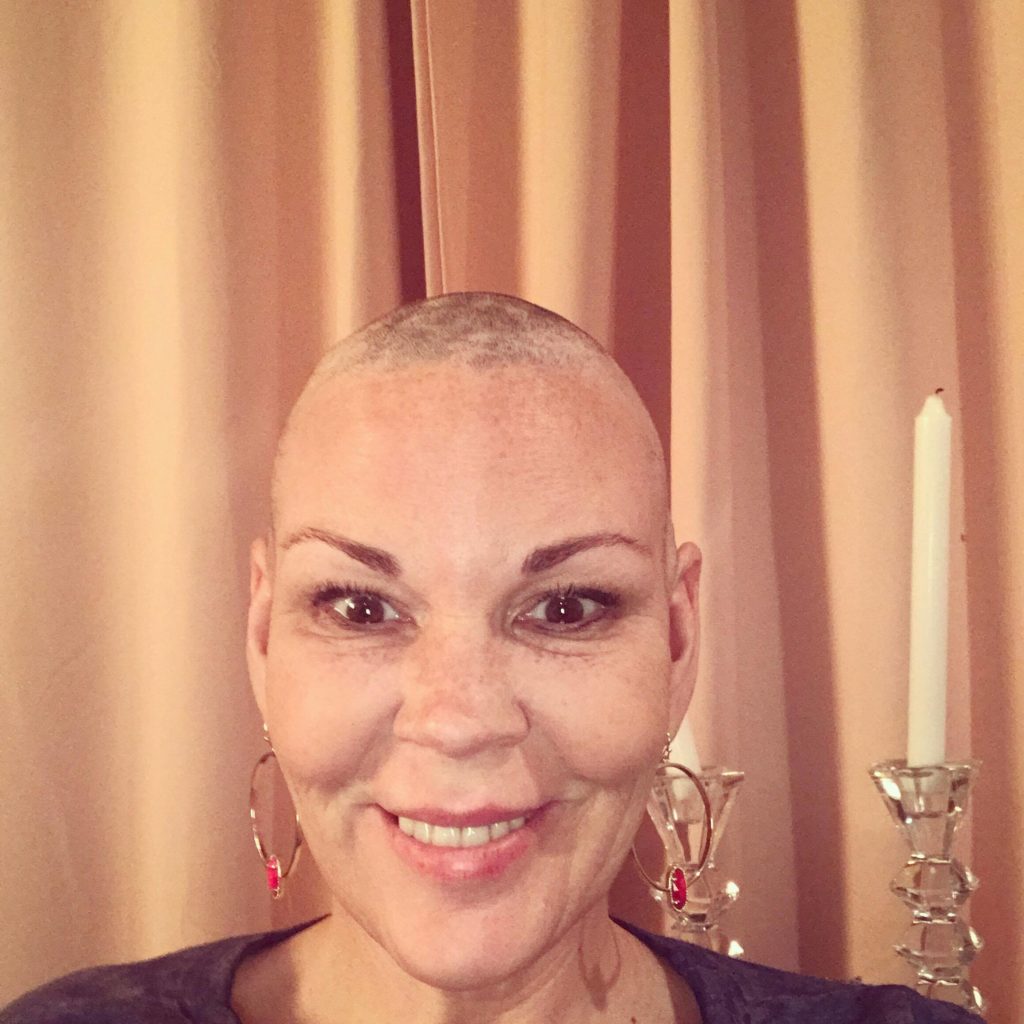
Wow, thank you for sharing that. It definitely is something to learn. Sometimes for people it is easier to just withdraw. So, on that opposite end, what’s the best support or advice you got?
Keep fighting. That’s what my friends always tell me. And there are some women I talk to via the Facebook group who are like, “Well I had my treatment. It came back no evidence of disease. I’m not getting any more tests. If anything happens it happens.” I have never been one to be in that mindset. I’m a fighter and a I’m a positive person. So not getting treated or following up with my doctor- those just aren’t options for me because of how I am. I would say that – the term that I used before my new normal and that’s exactly what it is. Even when I had the three months when I thought there was nothing else wrong, still I wasn’t the same person I was before I was diagnosed. And it is a new normal that you need to get used to but you can and you will and you just have to keep living. Day by day, take it day by day, and just make each day the best you can because there is no reason to isolate yourself, there are so many people who want to help and are just dying for an opportunity to take you to breakfast or whatever. And let those people in, don’t shut them out.
That’s a wonderful piece of advice. You said you’re not the same person who were before cancer. Would you say there’s anything that’s transformed in your outlook in general since being diagnosed?
Yeah, I think- this is horrible- but I was probably a little judgmental before all of this. I think that has gone away. I realized at the end of the day we’re all people, we’re all the same. Bad things happen to good people all over. That’s the main thing. And not judgmental in a Donald Trump way, hahaha. Like, about looking down on people because they didn’t go to college. Silly things like that that I felt were important. Those kinds of things don’t matter. It’s about the kind of person you are and how you impact others lives and that’s really something I’ve learn and I’ve tried to change my behavior. [I] do little things to make people happy. Whether it’s writing one of my staff members a note telling them how great they’re doing or sending my aunt a card [telling] her to keep going, or whatever it may be. I think I’ve found myself to be a little more thoughtful because of what I’m going through.
That’s powerful. Are there anything other challenges you’ve been facing?
Well, one challenge have is working out. I used to work out a lot and I haven’t had the energy to do it like I used to. That makes it difficult but yoga helps so much with everything. If can’t make it through a full yoga workout, I can at least do some poses to help with different pains. I ended up getting a [stationary] bike so I have something here at my house. So even if I don’t feel great I can get on that for fifteen minutes and feel like I’ve done something. Not using the weather or not getting out as an excuse. I don’t have an excuse now. I can do things at home that are somewhat active, not as much as I used to be. That has helped me a lot mentally because that’s kind of my thinking time and when I have my good work ideas when I’m working out. So, I’m thankful to be able to do a little bit of that still.
Would you recommend yoga for other people battling?
Oh, without a doubt. I would also recommend foam rollers. They are amazing with any kind of pain. I have several different sizes I use, I have a travel one I take with me when I have work trips. Yoga is good for so many different things. Any area that hurts if you were to google it and google yoga pose you would find one that would work for you. Even people who haven’t done it before. You can do it in your house. You don’t have to buy all this gear and go to class. you can pull up workouts online. It’s something you can do for yourself by yourself without any fear of feeing silly. It can help so much with your mindset too. Really, it’s calming. For me, that’s very important too. I’ve had a lot of anxiety with this- especially the second diagnosis. So that helps me connect on a different level I guess. And of course, I read my bible more and I pray more and I read daily devotionals. I know that’s not everybody’s cup of tea, but for me having that brings me a lot of peace.
If a friend of yours was diagnosed with the same cancer, what would you tell them and what would you want them to know?
First and foremost, I’d want then to know I will be there for them as much or as little as they want me to be. Just having that and letting them know that any questions or concerns or anything they might be experiencing that they don’t necessarily feel they have to call their doctor about, but it’s something that’s happening that I’m there to share my experiences and to help however I can. But I’d also tell them to let people in and not be afraid to tell people about it because, like I said before you don’t really know how much you need people until they’re there for you. It’s one thing when you sit in the morning and write in your journal and pray and do whatever your morning routine is. But it’s another thing to know that you have hundreds of people out there who are praying for you and whose churches are praying for you and who are fighting with you. That’s the main thing. Let people fight with you because it’s a lot easier than doing it on your own.
And no matter what they say, nothing’s death sentence.
You know, you could get hit by a car tomorrow. My five-year chances of survival are 20% and that’s not fun umber to think about. The way I choose to think about it is that 20% does not include everyone who looks exactly like Rachael. That includes people who are 8- years old. That includes people who are obese. You’re not really comparing apples to apples. I would say, any stats that you hear you have to keep those [other] things in mind. You can’t dwell on the negative. You have to make goals for yourself and keep going as you normally would. My doctor and I- her goal for me is five years, my goal for me is 25. We have different goals, we’re gonna try our best to get there. I think it’s important to continue living and continue to set goals for yourself and continue to better yourself just like you would if you didn’t have the disease. You can’t stop living once you get the diagnosis. We all have so much to give and so much to learn and so many more things that we can do. Most of the time it’s not a death sentence. For me, I tend to look at it like I have diabetes. If I had diabetes I would have to take a shot every day or modify my diet to maintain a healthy life. And with this, I’m looking at it as I have to do chemo for six months and then immune therapy, it’s just like what another
would have to do to maintain their life. So that’s how I look at it. In doing so, that’s helped me because I just look at it as a part of my life but not my whole life.
Thank you so much for your authenticity in answering these questions. I really appreciate everything you said. Before we conclude, is there anything else you really need to share about your experience.
I’m starting a blog! I’m a big writer and I need a creative outlet. I’m into fashion and I also collect vintage scarves. It’s not going to be all cancer related, of course I’ll talk some about my experiences, but it going to be motivation for me to A- Be creative but B- also get up, get dressed, find something cute to wear. All my cute clothes just sit there because I’m in sweats or I don’t feel like getting dressed. I thought that’ll be a good way to get out my writing, be a little creative and maybe inspire someone else as well. I’ll let you know once that gets going!
Absolutely, I would love to read that! Keep me updated. Thank you for taking time with us today!
Rachael’s blog can be found at http://www.100scarves100days.com/ Please take a look and follow her along her journey !

